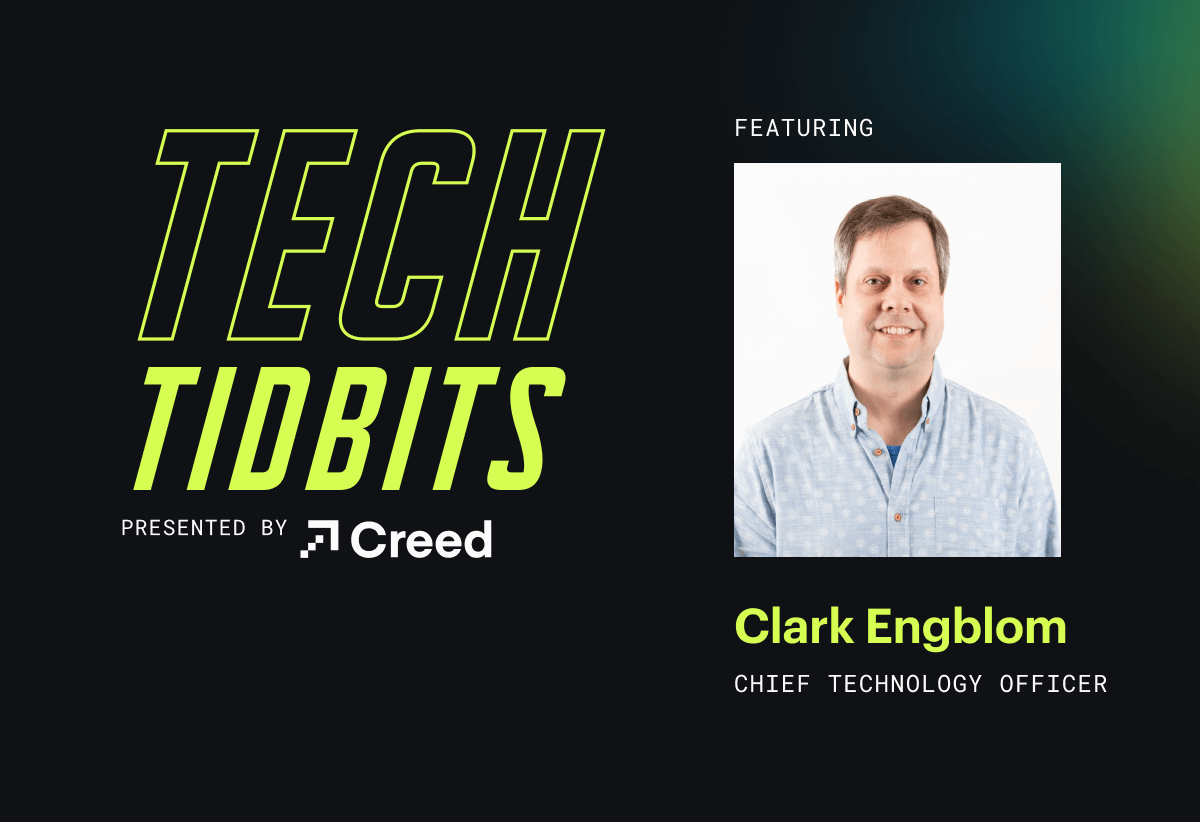
Tech Tidbits Ep. 3: Clark Engblom

Below is the transcript of the video
Chris: Hello, Clark.
Clark: How you doing?
Chris: I’m doing well, Clark. How are you?
Clark: I’m doing well. Kind of funny for me to ask you how you’re doing after we just talked for two minutes, right.
Chris: Anyway, so this is Clark Engblom.
Clark: He’s the CTO here at Creed Interactive.
Chris: Thanks for taking the time to talk to us today, Clark, and let us know about your world as CTO at Creed Interactive.
Clark: Of course. Are you ready for some hard-hitting questions?
Chris: I’m all set. What do you have for me, Chris? All right.
Clark: So you wear a lot of hats here at, at Creed as a CTO.
Chris: Tell us about your roles.
Clark: So at the end of the day, um, we approach technology as a company and deliver reliable solutions to our clients is really my top priority. But beyond that, I do wear a lot of different hats. So I’m highly involved with, uh, recruiting and hiring top tech talent, uh, growing team members, skill sets, and setting them up for success, uh, lining up new projects and clients through the sales process, and then helping to cultivate a good culture and work environment, uh, for everyone here at Creed.
Chris: Very good. All right.
Clark: What separates Creed Interactive from other agencies?
Chris: From, well, this is an easy one, Chris.
Clark: My first answer is always our people. So as a people-first digital agency, our team members do genuinely care and want to help each other out and our clients, um, make our clients successful. So not only do our teams put a lot of emphasis on delivering optimal solutions, but they do it in a way that is fun, collaborative, and makes the work we do exciting.
Chris: Great. Tell me about your management style.
Clark: Good question. So, uh, to me, management is really more about, um, that, uh, setting people up, uh, or more with the concept that, uh, people are well-intentioned and deserve the opportunity to succeed. Um, but at the same time, team members need access to the proper tools and training mentors and environment around them. So, to me, the role of management, um, is more about, uh, setting the team members, putting the team members into the position to be successful while implementing the proper guide rails to help them be most effective. So I prefer more of a team-based management style over more of the traditional top-down approach that you see at, at a lot of places.
Chris: Sure. Alright.
Clark: So what do you look for when you’re hiring developers?
Chris: So, the, the, the first thing that most people think of when hiring developers is, uh, their, their tech skills and how they write the code, their quality, and how they do it quickly. But it’s not just about that. Um, it is important, but not the only thing. Um, so it’s just as important to be a good developer to be able to work well with others in a team environment, to have a hunger to learn and challenge themselves to get better over time and be willing to do what it takes to make a project successful, even at times when it’s not the most exciting or fun work. So at Creed, we try to emphasize the idea of being a, a well-rounded developer. So that means, uh, that not just the technical skills, but also having the, the non-technical skills are equally important.
Chris: Excellent. So what makes for a good development team?
Clark: Uh, sure. So, uh, my, my first response to that would be balance. Um, so on technical projects, even though it feels like there’s one thing being built or one product, um, there’s actually a lot of technologies that go into it. And I know a lot of times developers will call themselves full-stack developers. Um, but to me, that means that they’re probably good in a few areas, but not always experts in all of them. Um, so for example, what I would think of as more of a front end based developer would be ones that are good at the more on the HTML CSS and JavaScript side of things. Backend would be more dotnet, Java, um, middle-tier type developers with PHP, um, including JavaScript and TypeScript. Um, then it’s even further down the stack would be a database, uh, infrastructure hosting and, and so on. So at the end of the day, no developers necessarily expert in all these areas. Um, it’s good to have developers who are exposed and know a lot of different technologies, but really having, um, team members who compliment each other across all the skill sets is really pretty important. And of course, it helps when everyone gets along and works well together too.
Chris: So what is the key to a good client relationship?
Clark: Sure. So over the years, we’ve learned that the, the best client relationships are really the ones that are, um, more of a partnership than, um, just, uh, coming in and doing the work and moving on to the next, uh, next thing. Um, so at the end of the day, when we work on a project for a client, we should be just as vested in the project as they are and vice versa. Um, so when we approach a relationship and a project with a long-term outlook in mind, we are more likely to achieve a positive outcome and develop a long-term relationship than not. Um, so a big part of our operating model is to treat our client’s business as our own, and as such, we need to be considered to their needs and keep in mind their best interests when we’re, um, working on their projects, making decisions and, uh, um, setting them
Chris: How have technologies used on projects evolved since you started here back in 1942.
Clark: Well, I can say for sure, Chris, that I wasn’t alive in 1942, and Creed didn’t exist then. However, during my 10 years here at Creed, the technology and types of projects we work on have evolved rather dramatically. In the earlier days, when I first started, we had a few custom development projects, but a lot of our work was based on existing platforms like CMSs and CRMs, or more maintenance-type work where projects already existed, and we stepped in to support and enhance them. Since then, we’ve expanded our capabilities to include custom development, single page applications, APIs, databases, infrastructure like Azure, AWS, and GCP, and even mobile projects. We still have a strong platform presence with CMSs, but we’ve also continued to expand our capabilities and improve with added experience and better-established processes.
Chris: It’s fascinating to see that evolution. What emerging technologies currently have you excited?
Clark: As most everyone at Creed knows by now, AI is really at the top of the list for me. AI technologies are still pretty new and, in many ways, unproven, but they have huge potential and can impact the lives of technology users and how we build and implement technology. Despite the hype around AI, I believe a lot of it is merited based on its capabilities and potential.
Chris: Looking ahead, how do you think agencies will evolve in the future to embrace changes in technologies in the marketplace?
Clark: One thing I’ve learned over the years is that change is inevitable. Technology continues to evolve along with clients and user expectations. The best way for an agency to stay relevant is to embrace that change, understand market needs, and offer products and services that help clients thrive as a business.
Chris: Moving to the bonus round here. Are you a little bit country, or are you actually a little bit rock and roll.
Clark: Well, probably a little bit of both.
Chris: Interesting. Now, would you rather catch a hundred perch or one carp?
Clark: Definitely a hundred perch. Have you ever tried eating a carp before, Chris?
Chris: Right, with your background in farming, did you get into technology because of server farms?
Clark: Yes, that’s pretty clear.
Chris: Let’s shift gears. What is the best part of being my boss?
Clark: Well, you show up on time every day, so you know, you have to start somewhere, right?
Chris: That’s a good start. I’ve never seen you angry. Have you ever considered taking anger management courses?
Clark: Well, I don’t know if they offer anger management courses for coping with getting angry. Maybe someday I’ll need it; maybe it’ll all come together.
Chris: Finally, you come across as a good dad. Are you, or is it all just smoke and mirrors?
Clark: Well, you’d have to ask my kids that one.
Chris: Thank you, Clark, for taking the time to talk to me today. I appreciate it.
Clark: Thank you, Chris. I’ll talk to you later then.